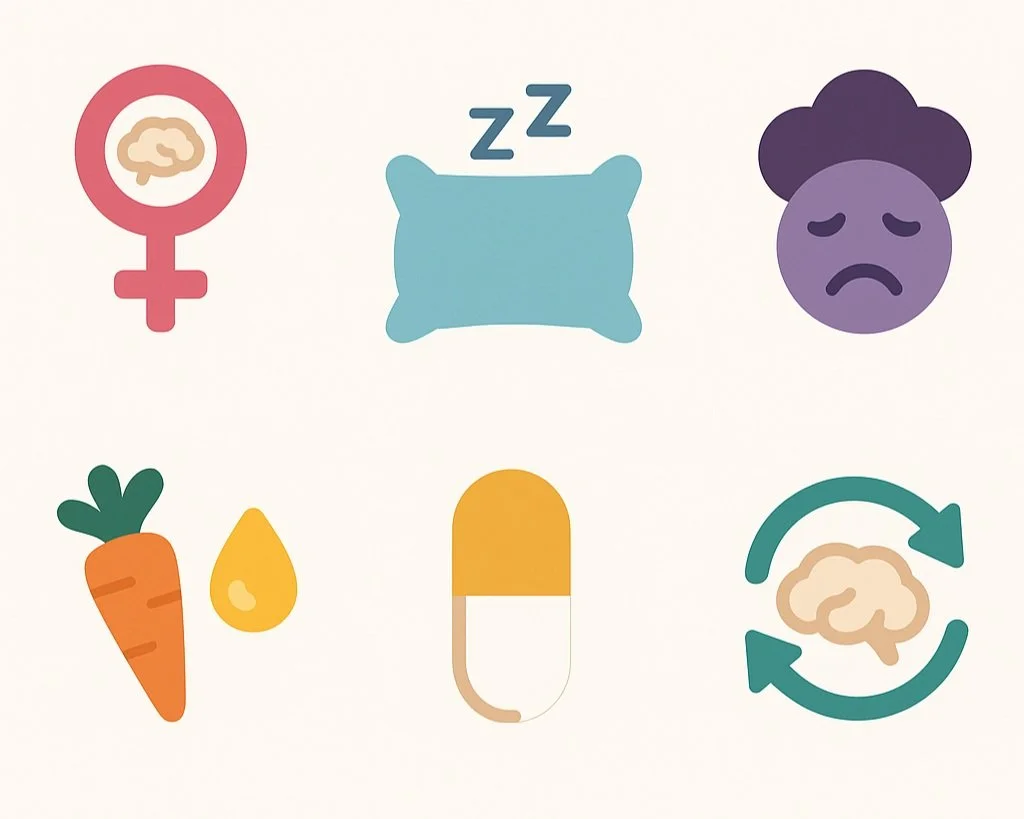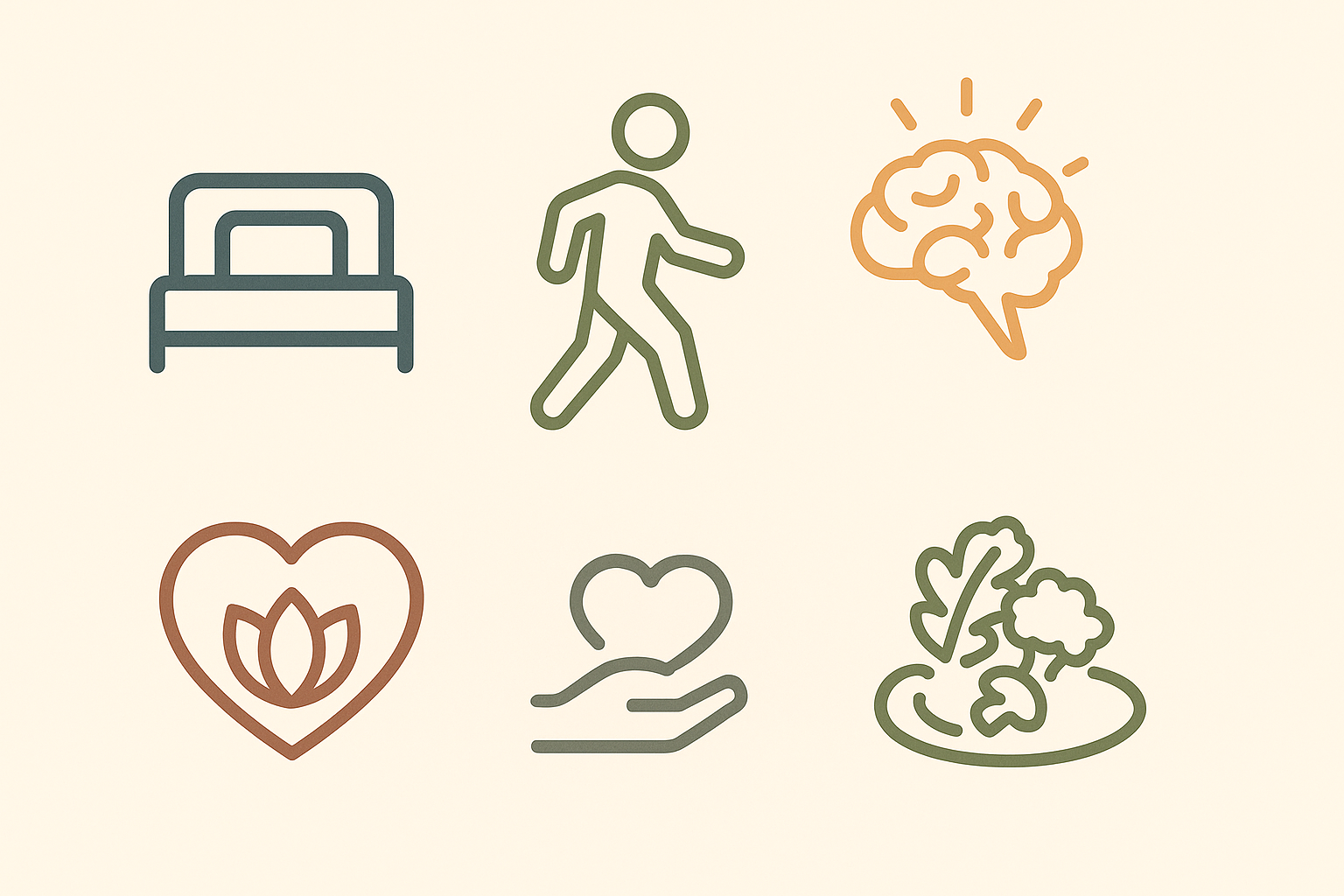Brain Fog After 50? Here’s What Might Help
Brain Fog After 50? Here’s What Might Help
Many people in their 50s and beyond notice “brain fog” creeping into daily life. You walk into a room and forget why—or misplace your glasses for the third time this week. These small lapses—sometimes called senior moments—are common and usually not a sign of serious illness. According to experts at OHSU, these changes are often a normal part of aging.
“Brain fog” isn’t a clinical diagnosis, but it describes familiar experiences: forgetfulness, slower thinking, fuzzy focus, or mental fatigue. These symptoms tend to become more common with age—especially during midlife and around menopause—and can feel frustrating even though they’re typically mild. The good news: by understanding what causes brain fog and making targeted lifestyle changes, many people can sharpen their minds and think more clearly.
What Is “Brain Fog” After 50?
Brain fog refers to temporary clouded thinking or slower cognition. You might forget why you entered a room, struggle to find the right word, or feel mentally sluggish. Such episodes are especially common during midlife and beyond, as factors like sleep issues, stress, and hormonal shifts begin to affect cognition.
But here’s the key: brain fog does not significantly hinder daily functioning. According to Harvard Health, mild memory lapses are part of healthy brain aging as long as they don’t disrupt your ability to handle everyday tasks. Still, they can be puzzling—so let’s explore why they happen and how you can get ahead of them.
Common Causes of Brain Fog in Your 50s & 60s
Hormonal Shifts
Estrogen levels drop during menopause and can disrupt memory and clarity. Many women report increased fog and forgetfulness. Fortunately, many symptoms are temporary and improve with lifestyle support and stress reduction.Sleep Issues
Quality sleep is essential for memory consolidation and mental clarity. Harvard research links disrupted or insufficient sleep with cognitive slowdowns—especially in midlife.Stress, Anxiety & Mood
Chronic stress raises cortisol, which interferes with memory and focus. Depression, too, can show up as forgetfulness. Practices like mindfulness and daily routines—sometimes anchored by a calming ritual like a morning walk or even a piece of functional chocolate—can help regulate mood and cognition.Nutrient Deficiencies
B₁₂, vitamin D, and omega-3s all support healthy cognition. A well-balanced diet is key—but many adults turn to supportive tools like functional foods to help bridge gaps in their routine.Medication Side Effects
Some common medications can cause cognitive dulling. Always consult with your provider if brain fog appears after starting a new prescription.Natural Brain Aging
As we age, the brain naturally shrinks slightly and produces less BDNF—a key protein that supports memory and neural plasticity. While this is normal, certain daily habits and nutrients (like exercise or polyphenol-rich foods) have been shown to help support healthy BDNF levels.
Actionable Strategies to Clear the Fog
1. Prioritize Sleep
Aim for 7–9 hours of quality sleep. Keep a consistent bedtime, avoid screens late at night, and create a calming evening ritual. Ingredients like ashwagandha and magnesium are being studied for their ability to help regulate stress and sleep quality—some people now incorporate them in gentle, food-based formats to support winding down.
2. Move Your Body
Exercise boosts blood flow to the brain and has been shown to increase BDNF. You don’t need to run marathons—a brisk walk, yoga, or even light dancing can make a real difference. Try pairing movement with a natural energy support—some people turn to adaptogens like Cordyceps or coffee fruit extracts for a smooth lift without the crash.
3. Engage Your Mind
Learn something new, play strategy games, or take up a hobby that challenges your thinking. Brain plasticity doesn’t stop at 50—it just needs the right inputs.
4. Support Your Mood & Stress Response
Mindfulness, therapy, and intentional self-care rituals all help. Even small choices—like replacing a sugary afternoon snack with something purposeful—can give your brain a boost. Terra’s blends, for example, were designed around this idea: that functional foods can offer moments of calm and clarity in everyday life.
5. Eat for Brain Health
Mediterranean and MIND-style diets, rich in plants and healthy fats, are linked to better cognitive aging. In addition, compounds found in berries, dark chocolate, and mushrooms are gaining attention for their potential brain-supporting effects. Lion’s Mane, for example, has been studied for its impact on memory and neuron growth. Coffee fruit extract, found in CognatiQ™, has been shown to help raise BDNF levels in small studies. These are the types of ingredients we’ve chosen to include in our functional chocolate blends— to create meaningful support over time.
The Bottom Line
Brain fog after 50 is real—but it’s also manageable. In many cases, it’s the result of stress, poor sleep, nutrition gaps, or natural brain aging—not a sign of disease. The better news? There’s a lot you can do about it. With intentional habits, nourishing food, movement, and rest, your brain can feel sharper, clearer, and more supported.
At Terra, we created our products with this exact need in mind: to make brain support part of a joyful, daily ritual—not a chore. Whether it’s the functional mushrooms, the naturally energizing ingredients, or simply the taste, our goal is to help you support your brain without overcomplicating it. One small habit at a time.
Want to try daily brain support in a chocolate bar? Explore our blends here.
Sources
OHSU: “Senior Moments vs. Alzheimer’s” – https://www.ohsu.edu/womens-health/brain-fog-vs-dementia?
Harvard Health Publishing. “Memory.” Harvard Medical School, https://www.health.harvard.edu/topics/memory.
Mayo Clinic Staff. (n.d.). Vitamin B-12: What you should know. Mayo Clinic. https://www.mayoclinic.org/drugs-supplements-vitamin-b12/art-20363663
National Institute on Aging. (n.d.). Cognitive health and older adults. U.S. Department of Health and Human Services. Retrieved June 22, 2025, from https://www.nia.nih.gov/health/cognitive-health-and-older-adults
FutureCeuticals. CognatiQ®: A Better Brain for a Better You. Accessed June 22, 2025. https://www.futureceuticals.com/cognatiq





